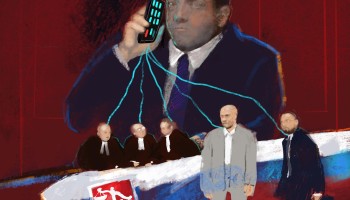Jocic, who has not been charged in Croatia, has been in custody in Serbia since last year and will face trial in Belgrade. Jocic is a prime example of pan-Balkan organized crime that has plagued the region since even before the 1990s wars – he served time for murder, is believed to have been heavily involved in narcotics trafficking and murder in Bulgaria, and has been referred to as the “King of Cocaine” in the Serbian press.
Croatia launched a crackdown on organized crime after Pukanic’s murder, and hopes to eventually join the 27-nation European Union.
BAE Settles in US
British weapons maker BAE Systems, dogged by five years of investigations into alleged bribery, agreed in the US last week to plead guilty to two charges and pay nearly $450 million to settle a case related to billions of dollars in deals with Saudi Arabia, the Czech Republic, Hungary and Tanzania. The New York Times had some details:
Under its settlement with the Justice Department, BAE will pay a $400 million fine and plead guilty to one count of conspiring to make false statements about having an internal program to comply with antibribery laws. The Justice Department’s charge related to just a small part of the billions of dollars in payments that BAE is thought to have made to Saudi Arabian officials over a 20-year period, and to more than $200 million of business that the company won in arms deals involving the Czech Republic, Hungary and other countries.
BAE, which is based in Britain, made the payments through a network of middlemen and Caribbean and Swiss bank accounts to win contracts for fighter planes and other equipment that American military companies were also seeking, the Justice Department said.
BAE said it would also plead guilty in London to an accounting violation for failing to properly record commissions paid to a marketing consultant involved in its sale of a radar system to Tanzania in 1999. BAE said it would pay about $50 million in Britain in fines and a charitable payment to Tanzania.
The settlement brings to an end the years of back-and-forth between investigators and whistleblowers on one side – who had alleged that BAE illegally paid off foreign officials via a system of offshore slush funds and shell companies – and the company on the other side, which for years baldly denied all wrongdoing. The UK’s Guardian found it shameful that after years of investigations in the UK, it took US prosecutors to bulldoze an admission of wrongdoing out of the company. (UK authorities dropped the Saudi case in 2006 because Tony Blair, who was prime minister at the time, believed the investigation could harm Britain’s national security.) An op-ed in the same paper criticized the settlement, saying that now the full extent of the dodgy deals will be forever unknown.
In other shell companies news, a US Senate subcommittee recommended last week that the US get rid of loopholes that are a) making a travesty of anti-money laundering laws, and b) allowing corrupt officials abroad to funnel money into the US. Millions in dirty money has been parked in the US thanks to banks’ laxity in screening clients, and thanks to lawyers, lobbyists, real estate agents and escrow agents who aided and abetted the money laundering, according to the report from the Permanent Senate Subcommittee on Investigations (chaired by anti-money laundering rock star Senator Carl Levin). One of the four eyebrow-raising examples the report cited was that of Angolan arms dealer Pierre Falcone, who bought a $9.6 million house in Arizona and kept US bank accounts that handled $60 million in transactions over eight years. The subcommittee recommended that Congress revoke money-laundering rule exemptions for lawyers, real estate agents and others, and pass laws requiring people who form corporations to disclose the true owners.
Balkans Roundup
Albania’s parliament last week extended the country’s ban on speedboats on the country’s Adriatic Sea coast for another three years, to continue Albania’s attempts to keep human and drug traffickers from zooming over to Italy and Greece. The ban was originally imposed in 2005. Under the law, police, customs, fishing boats and tourists’ yachts are the only craft allowed to head out to sea from Albania.
Bulgaria’s interior minister is being chauffeured around in a bulletproof BMW and his house is under heavy police guard, reported Bulgarian media last week, citing unspecified threats. Tsvetan Tsvetanov last month announced a new crackdown on organized crime; his police force last month arrested an alleged gangster for organizing a writer’s murder, and late last year they broke up a kidnapping ring.
In Macedonia, a dozen political parties banded together last week to form an opposition front aimed at bringing down the current prime minister. Their platform, besides being heavy on Yugo-nostalgia (supporters waved likenesses of Tito and banners that read “Long Live Brotherhood and Unity”), also has a major anti-corruption element. Bulgaria’s Focus news agency had the story:
The major goals and priorities of the platform, which was signed by 12 political parties, aim at inflicting a defeat on (Prime Minister) Nikola Gruevski, putting an end to the dangerous transition to ‘single-mindedness’, dictatorship and absolutism, framed-up tender procedures, crime and corruption, the collapse of the country, as well as at stopping the economic failure of the country in all fields and returning Macedonia to the right track, which will guarantee its European future, the newspaper writes.
Italy: Palermo Trial Nags Berlusconi
Poor Silvio Berlusconi. The billionaire Italian prime minister just can’t get a break. His wife is divorcing him, Italian courts are trying him for corruption, a crazy man smashed a model of the Milan cathedral into his face, and last week a Palermo court heard that it was the Mafia that gave him his first big break in business in the 1970s.
The Palermo court is trying a senior Carabinieri officer for protecting La Cosa Nostra boss of bosses Bernardo Provenzano and helping him evade arrest. (Provenzano was arrested in 2006 after four decades on the run.) Trial witness Massimo Ciancimino, the son of a Mafia don who was close to Provenzano, said that his father and two other Mafiosi had used front companies to invest their dirty money into a massive housing complex Berlusconi was building outside Milan. The Daily Telegraph had the story:
There has been intense speculation as to how the young Mr Berlusconi, who came from a modest middle class family, raised the capital to fund the construction of the ambitious apartment complex, known as Milano 2, which included lakes, tennis courts, schools and shops.
Mr Ciancimino told the court: "My father diversified his investments to evade anti-Mafia investigators. He considered the Milan megaproject a bit pharaonic and he was hesitant, but then he decided to participate through various companies.”
Berlusconi’s lawyer denied the statement and said Berlusconi would sue Ciancimino.





